
– 23-4-2023-
THIRD SUNDAY OF EASTER
Gospel text : Luke 24:13-35
vs. 3 That very same day, the first day after the sabbath, two of them were on their way to a village called Emmaus, seven miles from Jerusalem,
vs.14 and they were talking together about all that had happened.
vs.15 Now as they talked this over, Jesus himself came up and walked by their side;
vs.16 but something prevented them from recognising him.
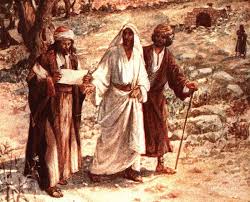 vs.17 He said to them, “What matters are you discussing as you walk along?” They stopped short, their faces downcast.
vs.17 He said to them, “What matters are you discussing as you walk along?” They stopped short, their faces downcast.
vs.18 Then one of them, called Cleopas, answered him, “You must be the only person staying in Jerusalem who does not know the things that have been happening these last few days.”
vs.19 “What things?” he asked. “All about Jesus of Nazareth” they answered “who proved he was a great prophet by the things he said and did in the sight of God and of the whole people;
vs.20 and how our chief priests and our leaders handed him over to be sentenced to death, and had him crucified.
vs.21 Our own hope had been that he would be the one to set Israel free. And that is not all: two whole days have gone by since it all happened,
vs.22 and some women from our group have astounded us; they went to the tomb in the early morning,
vs.23 and when they did not find the body, they came back to tell us they had seen a vision of angels who declared he was alive.
vs.24 Some of our friends went to the tomb and found everything exactly as the women had reported, but of him they saw nothing.”
vs.25 Then he said to them, “You foolish men! So slow to believe the full message of the prophets!
vs.26 Was it not ordained that the Christ should suffer and so enter into his glory?”
vs.27 Then, starting with Moses and going through all the prophets, he explained to them the passages throughout the scriptures that were about himself.
vs.28 When they drew near to the village to which they were going, he made as if to go on,
vs.29 but they pressed him to stay with them. “It is nearly evening” they said “and the day is almost over.” So he went in to stay with them.
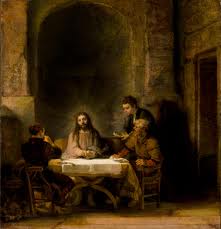 vs.30 Now while he was with them at table, he took the bread and said the blessing; then he broke it and handed it to them.
vs.30 Now while he was with them at table, he took the bread and said the blessing; then he broke it and handed it to them.
vs.31 And their eyes were opened and they recognised him; but he had vanished from their sight.
vs.32 Then they said to each other, “Did not our hearts burn within us as he talked to us on the road and explained the scriptures to us?”
vs.33 They set out that instant and returned to Jerusalem. There they found the Eleven assembled together with their companions,
vs.34 who said to them, “Yes, it is true. The Lord has risen and has appeared to Simon.”
vs.35 They they told their story of what had happened on the road and how they had recognised him at the breaking of bread.
**********************************
We have four sets of homily notes to choose from. Please scroll down the page for the desired one.
Michel DeVerteuil : A Holy Ghost Priest, Specialist in Lectio Divina
Thomas O’Loughlin: Professor of Historical Theology, University of Nottingham
John Littleton: Director of the Priory Institute, Tallaght D24
Donal Neary SJ: Editor of The Sacred Heart Messenger
*******************************************************
Michel de Verteuil
Lectio Divina with the Sunday Gospels – Year A
www.columba.ie
General comments
It is Easter morning, and Jesus leads the two disciples along the slow, painful journey to wisdom. God is inviting us to remember with gratitude times when he led us along a similar journey to the stage where we understood what was happening in our lives. We celebrate the teachers who did for us what Jesus did for the two disciples.
The story unfolds in several stages:
– Verses 13 to 16 : The disciples walk aimlessly along, unable to make sense of the events of Good Friday. Jesus the teacher is discreet, patient and content to walk silently alongside them.
– Verses 18 to 24 : Jesus invites them to tell their story, a long one, with many ups and downs, great hopes all dashed. Jesus listens in respectful silence. What a teacher!
– Verses 25 to 27 : Jesus’ long silence bears rich fruit – as always happens with great teachers. Now fully in tune with the experience of the disciples, he takes up the dialogue, showing that the teaching of the scriptures is not complete until it is experienced in the reality of their lives. As he teaches, what had seemed senseless to the disciples now appears not only meaningful, but in accordance with age-old laws of life.
– Verses 28 to 32 : What Jesus taught them on the road now becomes a reality in the context of a community meal.
– Verses 33 to 35 : This is a crucial part of the story: as a result of the encounter with Jesus and the wisdom they have gained, the disciples are able to return to their community with a new heart.
Prayer Reflection
 Lord, there have been times when we were totally discouraged. We walked aimlessly along the road, our faces downcast, as we remembered the sad events of previous days:
Lord, there have been times when we were totally discouraged. We walked aimlessly along the road, our faces downcast, as we remembered the sad events of previous days:
– a project which we thought would change our country had failed;
– we were disappointed in a relationship that had seemed destined to fulfil all our longing;
– a Church community we had hoped would be a true body of Christ was torn apart by conflict.
Then, quite suddenly, unexpectedly, you sent your son Jesus to walk with us, even though we did not recognise him. He came in the guise of a friend, a spiritual guide, a grandparent, who listened in silence as we told our story once more.
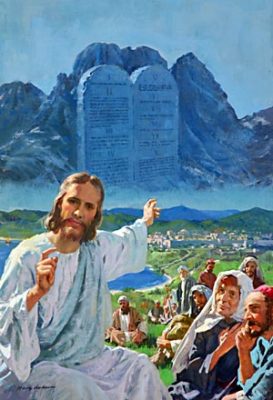
Then, when the moment was right, that Jesus whom you sent showed us how foolish we were, how slow to believe the full message of the prophets;
he explained the passages throughout the scriptures that were about ourselves while we listened in silence, our hearts burning within us.
We remember with gratitude how we were able to set out that instant and return to Jerusalem.
Lord, our apostles are walking the road, their faces downcast, unable to make sense of their lives.
If ye love me, keep my commandments. John 14:15.Forgive us, Church people, that we come arrogantly to them labelling them materialistic, or unbelievers, or atheists, and telling them our own stories.
Help us rather to be like Jesus,
*to walk alongside them so discreetly they don’t even recognize who we are;
*to ask them what matters they are discussing as they walk along;
*to invite them to relate their stories, even if they are impatient with our questions;
*to listen respectfully for as long as their stories last.
How else will we be able to explain the scriptures at work in their lives so that they can return to Jerusalem, their hearts burning within them?
Lord, send us bible teachers like Jesus
who will make our hearts burn within us as they talk to us on the road and, starting with Moses and going through all the prophets,
explain the passages throughout the scriptures that are about ourselves.
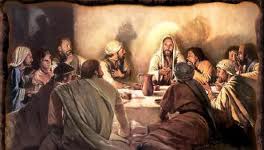 We thank you for those special Eucharists that we experience from time to time, when we recognise your presence in the breaking of bread
We thank you for those special Eucharists that we experience from time to time, when we recognise your presence in the breaking of bread
and feel no need to linger there,
but return to the Jerusalem of our daily occupations, our hearts burning within us.
Lord, we would prefer to grow in wisdom quickly and painlessly
by taking courses or reading many books. But there is no way to wisdom
except by going through times when we cannot understand what has happened to us; only when we have told our story many times over,
experiencing again and again how senseless it is will we reach down into the roots of our traditions and discover with surprise that what we have gone through is nothing new but the fulfillment of ancient prophecies.
 Lord, we get to know you through teachers and preachers, and we thank you for them.
Lord, we get to know you through teachers and preachers, and we thank you for them.
But it is only in a community of sharing and trust that we can experience your presence in the world.
How true it is that we recognise you in the breaking of bread.
**************************************************
Thomas O’Loughlin
Liturgical Resources for the Year of Matthew
www.columba.ie
Introduction to the Celebration
The Eucharistic assembly has a very 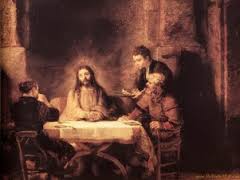 definite identity: those who have become one in the risen Christ through baptism, now celebrate that holy union with him in sharing a single loaf and cup — yet this is not how most people think of what they are doing on Sunday morning.
definite identity: those who have become one in the risen Christ through baptism, now celebrate that holy union with him in sharing a single loaf and cup — yet this is not how most people think of what they are doing on Sunday morning.
Homily Notes
There is a very strong element of self-reference in today’s gospel which carries on into the homily. Here we are now gathered for the Eucharist (which we understand as the weekly encounter of our community with the Risen Lord which takes place in the breaking and sharing of a loaf) reading an early Christian text (the Emmaus story) intended by its author to help his audience understand their gathering for the Eucharist by telling a story of another Sunday gathering around a loaf, except that that gathering at Emmaus is presented as the archetype and explanation of all later gatherings. Luke supposes that all his readers already have this Sunday gathering as part of their practical experience — in our terms, they take ‘going to Sunday Mass’ as a normal part Christian life — and then he wants to interpret that ritual using the medium of an ‘historical’ example, his logic being ‘look what happened on the first Sunday, therefore that is what is happening now today.’
So the gospel poses for us who are actually gathered for the Eucharist with a number of questions to see have we appropriated Luke’s vision of what our eucharistic assembly should be:
Do we see our weekly meeting as a moment when we hear the Word?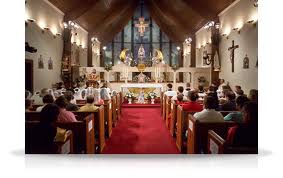
Do we see our gathering as gathered around the Lord’s table?
Do we see our eating together as having a share in the Lord’s body?
Do we see our group as one Christian body a unity formed from individual people symbolised in the one loaf (or a unity from individual grains)?
Do we see this as meeting with the Risen Jesus?
Do we see this as empowering us to go from this meal to proclaim the good news?
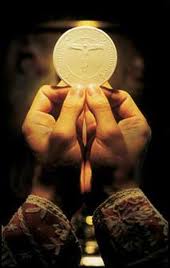 These are the questions the Emmaus story poses to us at our gathering — they are probably different questions from those it posed to those who were its initial audience — but in answering them we come not only to a deeper appreciation of today’s gospel, but to a realisation of its object: a deeper appreciation of the Sunday Eucharist.
These are the questions the Emmaus story poses to us at our gathering — they are probably different questions from those it posed to those who were its initial audience — but in answering them we come not only to a deeper appreciation of today’s gospel, but to a realisation of its object: a deeper appreciation of the Sunday Eucharist.
It would be an interesting exercise to pose the above questions as one set of poles on a questionnaire scale. The opposite poles would be something like
‘I get communion each week at Mass because it makes me holy.’ If we compared the Emmaus vision of the Eucharist with the actual perceptions of those who are celebrating with us, we might be rather shocked at the task of evangelisation facing us! One loaf and one cup shared has become the distribution of pre-cut ready-made individualistic roundels — and the cup which we say all should drink from is reserved to the just one person — that hardly speak at all as sacramental signs, much less challenge us to recognise our unity in Christ!
Lastly, we might ask ourselves as priests whether we see ourselves as those who ‘preside over‘ the community’s breaking of the loaf or those who ‘say Mass “with a congregation”?
And whether from the way we act, anyone might see a difference.
**********************************************************
John Litteton
Journeying through the Year of Matthew
www.Columba.ie
Gospel Reflection
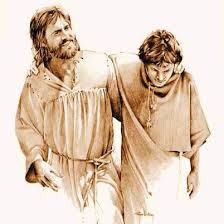 The story about the two disciples meeting Jesus on the road to Emmaus and how they recognised him at ‘the breaking of the bread’ (Lk 24:35) teaches us much about the Eucharist and, in particular, the way in which it provides food for eternal life.
The story about the two disciples meeting Jesus on the road to Emmaus and how they recognised him at ‘the breaking of the bread’ (Lk 24:35) teaches us much about the Eucharist and, in particular, the way in which it provides food for eternal life.
Food satisfies our physical hunger. However, sharing a meal also satisfies a greater hunger, the hunger for the deeper human need of companionship. Sharing a meal facilitates interpersonal exchange and, in so doing, promotes important human values. It symbolises and brings about unity among people.
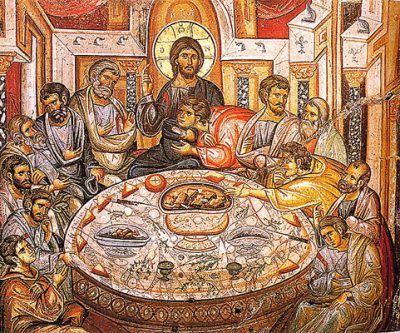 Similarly, the Eucharist provides food and deeper nourishment for our spiritual lives because it is the Bread of Life. Throughout the gospels we read that Jesus enjoyed gatherings and meals. He often sought companionship with other people, that resulted in him sharing something of himself and, ultimately, at the Last Supper, all of himself, with them. He used such occasions to teach the truth about himself.
Similarly, the Eucharist provides food and deeper nourishment for our spiritual lives because it is the Bread of Life. Throughout the gospels we read that Jesus enjoyed gatherings and meals. He often sought companionship with other people, that resulted in him sharing something of himself and, ultimately, at the Last Supper, all of himself, with them. He used such occasions to teach the truth about himself.
The love and generosity of Jesus in responding to the confusion and hopelessness of the two disciples on the road to Emmaus, and his teaching them the fuller meaning of his actions, offer us an insight into his own total self-giving for others at the Last Supper and in his suffering and death.
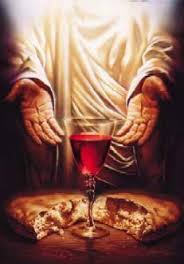 Jesus wants his followers to imitate his example. The challenging question for all of us who are Jesus’ disciples is: ‘Do we live in memory of him when we gather to share the Eucharist? In other words, how do we remember all that he said and in what ways do we practise what he did? Just as Jesus gave his life for the life of the world, so we are being challenged to follow his example, while acknowledging that it can be extremely difficult to put the interests of other people before our own.
Jesus wants his followers to imitate his example. The challenging question for all of us who are Jesus’ disciples is: ‘Do we live in memory of him when we gather to share the Eucharist? In other words, how do we remember all that he said and in what ways do we practise what he did? Just as Jesus gave his life for the life of the world, so we are being challenged to follow his example, while acknowledging that it can be extremely difficult to put the interests of other people before our own.
Therefore, the challenge of celebrating the Eucharist is: Can we respond to people as Jesus did? In effect, can we, in and through our own convictions and lifestyles that are nourished by the Body and Blood, Soul and Divinity, of Christ received when we celebrate the Eucharist, join with him in satisfying the spiritual hunger in other people’s lives? If we can, then we are living Eucharistic lives that flow from the selfless and self-giving life of Jesus Christ.
Meal times often degenerate into a hastily-eaten snack or a quick take-away. Similarly, the celebration of the Eucharist can become just another hastily-observed obligation or a meaningless ritual.
But the Mass is much more than a meal.
So let us try to make meal times at home and our participation in the Eucharist a time of genuine sharing and enrichment. In doing so, we acknowledge our gratitude for Christ’s abiding presence and nourishment in the form of bread and wine that have become his Body and Blood providing us with food for eternal life.
For meditation
And their eyes were opened and they recognised him; but he had vanished from their sight. (Lk 24:31)
*****************************************
Fr Donal Neary, S.J
Gospel Reflections for the Year of Matthew
www.messenger.ie
Hearts uplifted
I h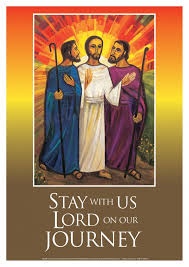 ave met many people who found this story really helped at times when they were down, when there were disappointments in life, when they encountered illness and many of the crosses of life. They believed in him after he had vanished, having broken bread with them. He had accompanied them in a dark journey of life.
ave met many people who found this story really helped at times when they were down, when there were disappointments in life, when they encountered illness and many of the crosses of life. They believed in him after he had vanished, having broken bread with them. He had accompanied them in a dark journey of life.
Jesus went to them – he did not await their visit. Somehow he knew that people of his ‘set‘ were in darkness and maybe despair. This is the call of the church – to be with us in prayer, community and service always, and especially for what Pope Francis calls’ the peripheries of life‘. Most of us spend some time there, and appreciate the help of love and faith.
Then they went to tell the story of how they were changed. Faith grows through sharing it. A father said, ‘At my child’s first communion, my faith became stronger’.
They told their story of Jesus in the here and now, sometimes reminiscing on what things were once like in Galilee. Every journey of life can be an Emmaus journey where we meet the Lord. Every altar can be the altar of Emmaus, and indeed every meal can be a time of friendship, care and nourishment for body and for soul.
Notice this week where the Lord is present in love, care, creation,
an uplift of joy, prayer and the Eucharist.
Lord, lift my hope and my faith in your presence as the disciples
found their hearts burning when they listened to you
***********************************************************